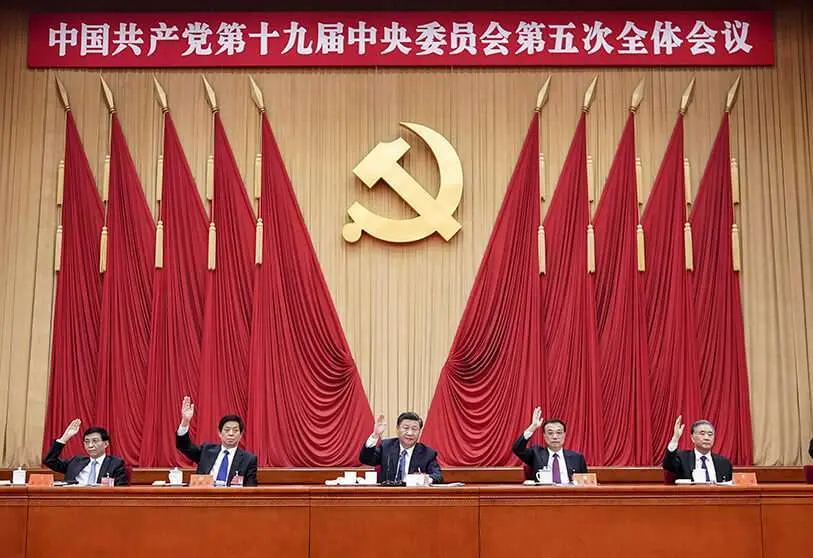Anti-communist liberals

This is the question: why China wants to grow economically, multiply militarily and reproduce itself as the leading global power in the 21st century. And these are some of the hypotheses to address the question: because China intends to strengthen its power in Asia and build a new regional order, once Hong Kong, Taiwan and the disputed archipelagos are integrated with full sovereignty; because it wants to extend its power to Eurasia to recreate a post-modern imperial influence that perpetuates Chinese power; because its ultimate goal is to turn the international order upside down by confronting the liberal system with Sino-communist authoritarianism. Although not rigorously confirmed, the first two hypotheses are most likely valid and successive. The third, highly unlikely, would require the Chinese Communist Party (CCP) to be a messianic party capable of speaking and convincing the world with a single message and a single voice. But since it is not, nor is the party itself convinced of its message, the Chinese general secretary and president Xi Jinping is putting forward another in its place, using his economic and propagandistic efficiency at the decaffeinated Davos Forum, transferred to Singapore in 2021, to proclaim himself as the great champion of liberal globalisation while the United States pulls itself together and vaccinates itself.
Still convalescing, the Americans are designing a revitalised foreign policy. The document 'The Longer Telegram', published in January by the Atlantic Council, a bipartisan think tank, warns of the urgent need to build a long-term (three decades) grand strategy that focuses on China as the priority threat, It must include the most solid democratic allies in Europe and Asia in order to develop it and understand China as a rival and competitive power but not as a perpetual territory of the Communist Party, and the latter as a permeable party and not as a sovereign space illuminated by Xi Jinping and governed by his most loyal ideologues. With a diversity of approaches that are not necessarily dominant, including, now in the second row, those of Deng's heirs, Jintao and Zemin. In other words, the moderate leaders who coexist with stable and stabilising progress and not the prophets of uncertain growth supported by a strategy of international destabilisation.
The free press, the New York Times, carefully observes the movements of both actors to interpret the evolution of the two systems. In an article by James Traub, among other references, it draws on the thinking and actions of the so-called Cold War Liberals, led in Congress by Senator Hubert Humphrey who, together with historians such as Arthur Schlesinger, theologians and social leaders, founded the Americans for Democratic Action in the 1950s, which formed a body of lobbyists and intellectuals to confront communism from liberal approaches. At the time, moderate progressives in the United States believed that to defeat communism it was necessary to build proposals and engage in the battle of ideas, in addition to strengthening military and strategic approaches and diplomatic action.
History proved both sides right. To the strategists and politicians who, like Reagan, stood up to haughty Soviet geopolitics, and to the intellectuals and leaders who based the growth of democratic liberalism on the principles of equal opportunity and respect for human rights. Realism and idealism united in the face of the common enemy that was then, and wants to be now, the totalitarian authoritarian authoritarianism against which the Americans of the second half of the 20th century fought.
The battle of ideas is the battle of words. The dominance of narrative is now said, in this world where the digital narrative appears decimated, eliminated, persecuted, by lies and deadly fake news. Many progressive liberals, and socialists, fell into the analogue and intellectual nets of Soviet propaganda during the Cold War. Others did not. Others, like Felipe González, turned the octopus head of Marxism, convinced that it was better to live freely in New York than oppressed in Moscow. Christian theologians and theologians of different religions argued that it was better to hold on to their beliefs rather than submit to the yoke of materialist authoritarianism. Social agents, entrepreneurs and politicians then saw social justice as a concept inseparable from the idea and concept of individual freedom. Irreproducible in regimes that harassed opposition and dissent. Impossible to achieve in client states without rights or democratic constitutions.
American liberalism, European ideology and the values of the international order cannot today fall into the tentacles of modern authoritarian propaganda that permeates discourses and the web. Xi Jinping, or any other leader of a politically unjust system, cannot fly the flag for a renewed, fairer and more social globalisation, neither in Davos nor in Singapore. The Italians have placed Mario Draghi at the head of a government that will have to manage 200 billion euros in European aid for Italy's recovery. Biden has launched a $1.9 trillion plan to revitalise the economy and American society, divided in the wake of the pandemic. The battle of ideas is also a battle of political and technocratic efficiency. A grand strategy shared and led by the major democracies.

